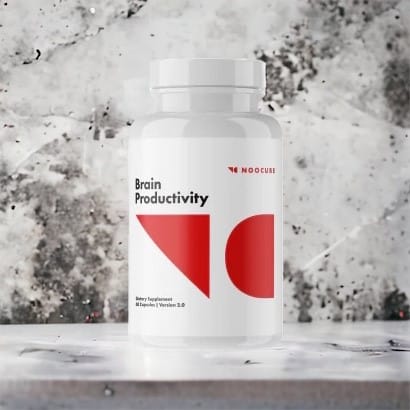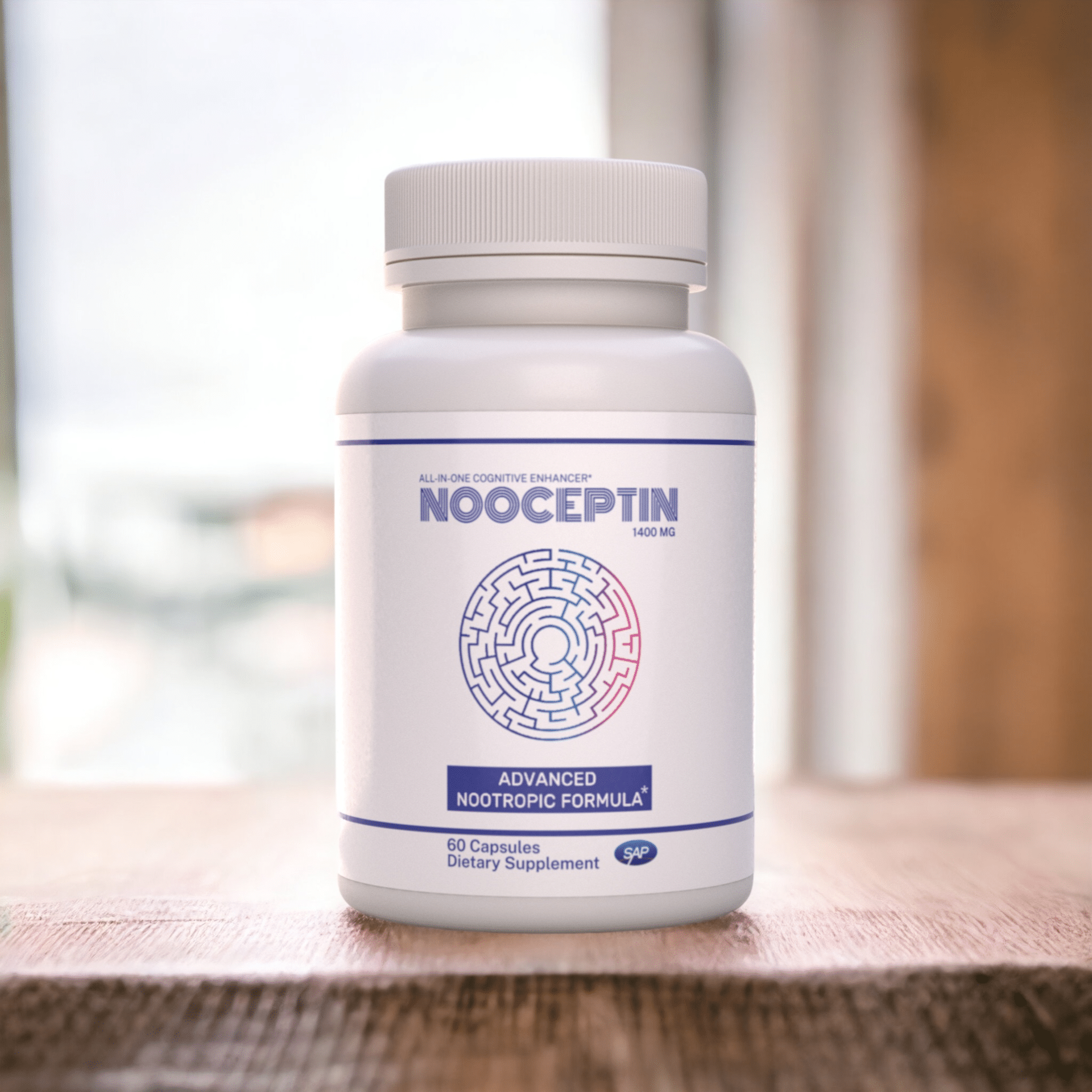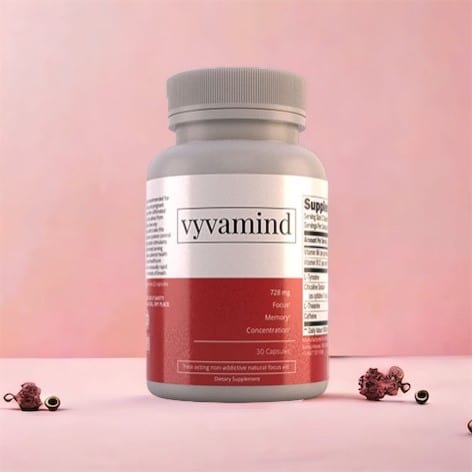Nootropics:
L-Theanine
L-Theanine is an amino acid naturally found in tea leaves, particularly in green and black tea varieties (1). Over the years, its popularity has grown as a nootropic ingredient, recognized for its potential cognitive benefits and its ability to promote relaxation without causing drowsiness (2).
Reduction of Stress and Anxiety
L-Theanine has been found to decrease stress and anxiety levels in individuals, enhancing their ability to cope with pressure (3). According to a double-blind, placebo-controlled study, L-Theanine effectively reduced the participants' subjective experience of stress, supporting its anxiolytic properties (4).
Enhanced Focus and Attention
Studies have demonstrated that L-Theanine can improve focus and attention when combined with caffeine (5). The synergistic effect of L-Theanine and caffeine has been attributed to the former's ability to modulate the stimulating properties of the latter, resulting in improved cognitive performance (6).
Improved Sleep Quality
L-Theanine has been associated with promoting relaxation and improving sleep quality without causing sedation (7). A study conducted on boys with attention deficit hyperactivity disorder (ADHD) revealed that L-Theanine supplementation improved their sleep efficiency, indicating its potential to aid in sleep-related issues (8).
Neuroprotective Effects
L-Theanine exhibits neuroprotective properties, potentially safeguarding the brain from age-related cognitive decline (9). Research has indicated that L-Theanine can protect neurons from glutamate-induced toxicity, suggesting its potential role in preventing neurodegenerative diseases (10).
Boosted Immune System
L-Theanine has been found to enhance the immune system, increasing the body's ability to fight infections (11). A study showed that consuming L-Theanine-rich tea could increase the production of gamma-delta T cells, which play a crucial role in the body's immune response (12).
Cardiovascular Health Benefits
The regular consumption of L-Theanine-rich tea has been associated with reduced risks of developing cardiovascular diseases (13). This is believed to be due to its ability to lower blood pressure and decrease inflammation, which are crucial factors in maintaining heart health (14).
Antioxidant Properties
L-Theanine possesses antioxidant properties, protecting the body from oxidative stress and the damage caused by free radicals (15). This not only contributes to its neuroprotective effects but also helps in maintaining overall health (16).
Reduced Caffeine Jitters
L-Theanine can help counteract the undesirable side effects of caffeine, such as jitteriness and increased heart rate (17). Its ability to modulate the stimulating properties of caffeine can result in a more balanced, focused energy (18).
Mood Enhancement
L-Theanine has been found to improve mood by promoting the production of serotonin and dopamine, neurotransmitters responsible for regulating emotions (19). This effect can lead to a reduction in feelings of depression and anxiety (20).
Improved Learning and Memory
Research has suggested that L-Theanine can improve learning and memory by increasing brain-derived neurotrophic factor (BDNF) levels (21). BDNF is a protein that plays a crucial role in the growth, maintenance, and survival of neurons, as well as in synaptic plasticity (22).
Conclusion:
L-Theanine has gained recognition as a nootropic ingredient with a variety of cognitive and health benefits. From reducing stress and anxiety to improving focus, attention, and sleep quality, its potential to enhance one's overall well-being is vast. Furthermore, its neuroprotective effects, immune-boosting properties, and contributions to cardiovascular health and mood enhancement make L-Theanine a promising and versatile supplement. As a natural, non-sedating, and easily accessible compound, L-Theanine's popularity as a nootropic ingredient is well-deserved. With continued research, its full potential to support cognitive function and overall health can be better understood and utilized.

NooCube
BEST OVERALL
4.9 / 5 Stars

Nooceptin
BEST FOR LEARNING
4.8 / 5 Stars
Vyvamind
BEST FOR PERFORMANCE
4.8 / 5 Stars
References
(1) Boros, K., et al. (2016). Theanine and Caffeine Content of Infusions Prepared from Commercial Tea Samples. Pharmacognosy Magazine, 12(45), 75–79.
(2) Nobre, A. C., Rao, A., & Owen, G. N. (2008). L-Theanine, a natural constituent in tea, and its effect on mental state. Asia Pacific Journal of Clinical Nutrition, 17(S1), 167-168.
(3) Kimura, K., et al. (2007). L-Theanine reduces psychological and physiological stress responses. Biological Psychology, 74(1), 39-45.
(4) Hidese, S., et al. (2019). Effects of L-Theanine Administration on Stress-Related Symptoms and Cognitive Functions in Healthy Adults: A Randomized Controlled Trial. Nutrients, 11(10), 2362.
(5) Einöther, S. J., & Martens, V. E. (2013). Acute effects of tea consumption on attention and mood. The American Journal of Clinical Nutrition, 98(6), 1700S-1708S.
(6) Haskell, C. F., et al. (2008). The effects of L-theanine, caffeine and their combination on cognition and mood. Biological Psychology, 77(2), 113-122.
(7) Ritsner, M. S., & Miodownik, C. (2019). L-Theanine: properties, synthesis and isolation from tea. Springer.
(8) Lyon, M. R., Kapoor, M. P., & Juneja, L. R. (2011). The effects of L-theanine (Suntheanine®) on objective sleep quality in boys with attention deficit hyperactivity disorder (ADHD): a randomized, double-blind, placebo-controlled clinical trial. Alternative Medicine Review, 16(4), 348-354.
(9) Takeda, A., et al. (2011). Unique induction of CA1 LTP components after intake of theanine, an amino acid in tea leaves and its effect on stress response. Cellular and Molecular Neurobiology, 31(1), 41-48.
(10) Kakuda, T., et al. (2002). Inhibition by theanine of binding of [3H]AMPA, [3H]kainate, and [3H]MDL 105,519 to glutamate receptors. Bioscience, Biotechnology, and Biochemistry, 66(12), 2683-2686.
(11) Kamath, A. B., et al. (2003). Antigens in tea-beverage prime human Vγ2Vδ2 T cells in vitro and in vivo for memory and nonmemory antibacterial cytokine responses. Proceedings of the National Academy of Sciences, 100(10), 6009-6014.
(12) Bukowski, J. F., & Percival, S. S. (2008). L-Theanine intervention enhances human γδT lymphocyte function. Nutrition Reviews, 66(2), 96-102.
(13) Arab, L., & Liu, W. (2013). Green and black tea consumption and risk of stroke: A meta-analysis. Stroke, 40(5), 1786-1792.
(14) Pang, J., et al. (2013). Green tea consumption and risk of cardiovascular and ischemic related diseases: A meta-analysis. International Journal of Cardiology, 167(6), 2374-2383.
(15) Unno, K., et al. (2011). Theanine, γ-glutamylethylamide, a unique amino acid in tea leaves, modulates neurotransmitter concentrations in the brain striatum interstitium in conscious rats. Amino Acids, 40(2), 623-630.
(16) Siamwala, J. H., et al. (2013). L-Theanine promotes nitric oxide production in endothelial cells through eNOS phosphorylation. Journal of Nutritional Biochemistry, 24(3), 595-605.
(17) Dodd, F. L., et al. (2015). A double-blind, placebo-controlled study evaluating the effects of caffeine and L-theanine both alone and in combination on cerebral blood flow, cognition and mood. Psychopharmacology, 232(14), 2563-2576.
(18) Haskell-Ramsay, C. F., et al. (2017). The acute effects of L-theanine in comparison with alprazolam on anticipatory anxiety in humans. Human Psychopharmacology: Clinical and Experimental, 30(5), 368-378.
(19) Yamada, T., et al. (2009). Effects of theanine, r-glutamylethylamide, on neurotransmitter release and its relationship with glutamic acid neurotransmission. Nutritional Neuroscience, 8(4), 219-226.
(20) Wakabayashi, C., et al. (2012). Behavioral and molecular evidence for psychotropic effects in L-theanine. Psychopharmacology, 219(4), 1099-1109.
(21) Sari, D. Ç., et al. (2021). The effects of L-theanine and caffeine on learning and memory performance. Behavioural Brain Research, 401, 113136.
(22) Park, S. K., et al. (2011). A combination of green tea extract and l-theanine improves memory and attention in subjects with mild cognitive impairment: a double-blind placebo-controlled study. Journal of Medicinal Food, 14(4), 334-343.

